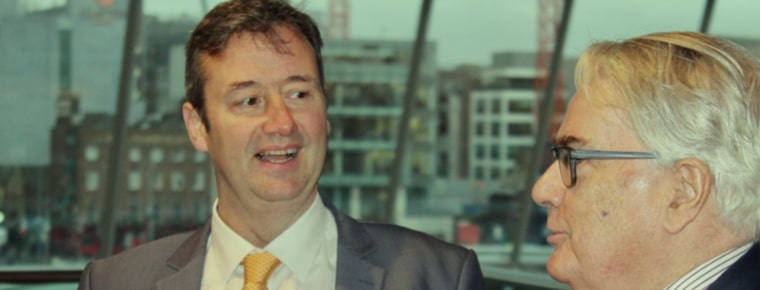 Minister of State Michael D'Arcy with Chief Justice Frank Clarke at yesterday's seminar
Minister of State Michael D'Arcy with Chief Justice Frank Clarke at yesterday's seminar
Fraud prosecutions hinge on evidence thresholds
The judiciary take seriously the matter of false or exaggerated compensation claims but, in accordance with the law, must operate on the basis of the evidence presented in court, Chief Justice Frank Clarke said yesterday.
“If fraud is to be established in insurance cases, we need evidence of it in court as we decide on a case,” he said.
Civil and criminal proceedings
The Chief Justice pointed out that there are important differences between civil proceedings and criminal prosecutions.
Evidence is assessed in civil cases on the basis of the balance of probabilities, while in criminal cases it is necessary that proof be beyond reasonable doubt.
While a civil court might reject plaintiff evidence in an injuries claim (on the balance of probabilities), it could still be unlikely that there would be sufficient evidence to prove that the claim was false or fraudulently exaggerated to the criminal standard of proof beyond reasonable doubt.
Mirrored in other jurisdictions
These thresholds apply in all civil and criminal cases and are closely mirrored in all other common law jurisdictions.
Speaking at an Insurance Ireland seminar on fraud in Dublin yesterday the Chief Justice said he had hand-picked the Personal Injuries Committee (PIC) of the nascent Judicial Council, after speaking to the various courts' presidents.
Risk
He said he wished to avoid any unnecessary risk of challenge to the structures required in law under the Judicial Council Act.
“We should not be rushed in a way which makes it open to legal challenge – if it is not done right, it becomes slower rather than quicker,” the Chief Justice said.
Therefore, formal nomination of members of the committee cannot officially happen until the Council is established and has its first full meeting to establish the various statutory committees.
The committee members-designate will meet shortly to set out their workload, pending formal establishment, the Chief Justice said.
Financial measures
He also welcomed the additional financial measures put in place to facilitate the early working of the statutory committees, including PIC.
The PIC agenda may include “benchmarking the levels of damages in Ireland to those in comparable countries, and not just the UK,” the Chief Justice said.
“It might also begin to ask questions and ask for information from other bodies, that it may require when it is established, so as to allow for the preparation of answers.
"These elements will allow it to significantly reduce waiting times on its work, upon its establishment in law,” he said.
Insurance lobby
However, Ken Murphy of the Law Society warned this morning that the well-oiled insurance lobby propaganda machine must not be the only voice heard, as the committee takes its soundings.
“It will be important, in the interests of justice, when the Judicial Council is considering whether, and if so, how to re-calibrate personal injury award levels in this jurisdiction –– that it does not receive submissions only from insurers and other defence interests.
“The insurers and defence interests have well-organised and well-funded propaganda machines which tend to dominate this debate.
“Judges and justice must give proper weight to all interests, including those of the innocent victims of accidents caused by the negligence of others,” the Law Society director general said.
Gazette Desk
Gazette.ie is the daily legal news site of the Law Society of Ireland